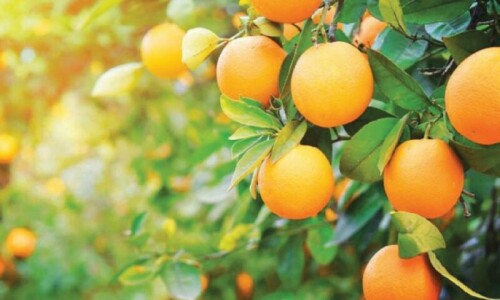ENCOURAGED by increased farm productivity but irked by water shortages, the Balochistan government is set to allocate more funds for irrigation and agriculture in the next fiscal year.
“Our next year’s agricultural development budget would be higher than this year’s and we will roll out several new schemes in such key areas as on-farm crop management and monitoring, orchard caring, solar tube-wells, tunnel farming, agricultural extension and value-chain upgradation,” a senior official of Balochistan agriculture department told this writer.
For the current fiscal year, Rs7.4bn was earmarked for ongoing and new farm development schemes in agriculture sector. And, Rs1.8bn was set aside for irrigation development.
Officials say on both heads, development spending would be increased, adding, that the provincial government has identified lack of adequate water supplies and absence of proper value-chain as two key constraints to agricultural growth.
In recent years agriculture in Balochistan has shown some progress in farm yields. The output of rice, cotton, fruits (particularly apples) and vegetables has increased. But the agriculture sector is still beset by complex structural problems.
“Water shortages, collapsing prices of farm produce, issues in payment of minimum support prices, inadequate farm-to-market infrastructure and near absence of proper storage and marketing facilities make it difficult to put agriculture on a higher growth trajectory,” according to a top official of the provincial government. In the last 10 years (between FY06-FY15), annual growth in Balochistan’s agriculture averaged at just 2.6 pc.
Farmers say the performance of provincial authorities is also wanting on many counts but most notably in their failure to persuade banks to meet the borrowing needs of the farming community.
The total output of fruits in Balochistan has also shown a rising trend in the last four years, from 1.08m tonnes in FY12 to an estimated 1.21m tonnes in FY16, a cumulative 12pc growth
Against the annual agricultural lending target of Rs7bn for FY16 actual lending in the province remains half a billion rupees. Provincial officials say that in addition to taking up this issue with the State Bank of Pakistan, they are also working on setting up the Balochistan Bank with the provincial government being its largest shareholder.
“Hopefully, we may be able to give good news in this regard in the next budget,” one senior official of the provincial finance department told this writer.
Despite limitations, the province’s farming sector is doing reasonably well, officials claim. Cotton output in Balochistan has increased 33pc to 76,000 bales (up to April 3) from last year’s 57,000 bales, thanks to improved pest management, they say.
Cotton growers say the output is expected to touch 1m bales next year, pinning their hopes on such factors like the province’s partnership with Better Cotton Initiative of the WWF Pakistan increased awareness among farmers about fixing cotton crop issues on time.
Wheat production in the province is also expected to reach the target of 0.9m tonnes this year, despite a 5pc decline in wheat sowing areas and shortage of drought like situation in rain-fed areas.
According to officials of the Ministry of National Food Security and Research, wheat was sown over 3.6m hectares in Balochistan against the target of 4m hectares.
“Still we can reach closer to the target of 900,000 tonnes on the basis of higher per-hectare yields,” says an official of provincial agriculture department boasting of how the province’s wheat yield has been showing a consistent increase for some years.
Per-hectare yield of wheat remained range bound between 2,100-2,200kg in the last 10 years, but officials claim this year it is set to surpass this level.
Officials and growers say that drought like situation in Balochistan had an impact on rice production in the last season adding that the production target of 0.61m tonnes could not be met. Actual output data will be announced by the federal committee on agriculture in its meeting on April 20.
Provincial officials and growers claim, however, that the per-hectare yield of non-basmati Irri rice (that has already been on the rise in the province) is estimated to have risen further to about 3,400kg in the last season from less than 3,200kg four years ago, largely due to adoption of new techniques for growing paddy with less water.
The per hectare yield of basmati rice remains a shade below 3,000kg per hectare and its production above 0.5m tonnes. Officials and rice growers say no big improvement is in sight in these numbers.
Total output of fruits in Balochistan has also shown a rising trend in the last four years, from 1.08m tonnes in FY12 to an estimated 1.21m tonnes in FY16, a cumulative 12pc growth.
Production of all vegetables (including potato) had begun faltering after touching a peak of 525,000 tonnes in FY12 but this, too, is estimated to have returned to the same level in the last fiscal year, officials say.
Output of other smaller crops, most notably castor seeds, has also been on the rise with improved cropping methods. Extensive research in castor seed farming in 2000s had boosted its per-hectare yield, thereby gradually attracting farmers to the crop in the last four, five years.
Published in Dawn, Economic & Business, April 17th, 2017













































